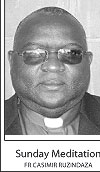The liturgy of the twenty-fifth Sunday in ordinary time is based on the following readings: Isaiah 55:6-9; Psalm 145; Philippians 1:20c-24, 27a; Matthew 20:1-16a.The main theme of our readings is a lesson on how much the Lord’s wisdom surpasses our human categories of value and judgment both as individuals and collectively as a community.


The liturgy of the twenty-fifth Sunday in ordinary time is based on the following readings: Isaiah 55:6-9; Psalm 145; Philippians 1:20c-24, 27a; Matthew 20:1-16a.
The main theme of our readings is a lesson on how much the Lord’s wisdom surpasses our human categories of value and judgment both as individuals and collectively as a community.
The prophet Isaiah while exhorting his people to search actively for the Lord; he warns them that the Lord’s ways are not obvious to human beings, and that he is to be sought while we have the opportunity.
Psalm 145 stresses the same idea explaining to us that the greatness of the Lord excels in graciousness, mercy, justice and kindness. But because of his love for us, he draws near to those who sincerely search for him.
The Gospel parable demonstrates to us the big difference between our spontaneous judgments and God’s ways. It exposes a common human mentality: If we do more, like the early labourers in the vineyard, our natural reaction is to claim more for ourselves than the latecomers who do less.
The lesson we get from this parable is the selfless nature of the service in God’s vineyard.
The way God proceeds in his treatment of the labourers is guided by his will to save all who want to work in his vineyard. The logic followed which seemed strange to the early labourers is that they too should have been made happy by the reward of the latecomers.
Hence, our work too, if truly done for the love of God and for the salvation of others, should be rewarded by the latecomers’ entrance into the Kingdom.
That is our wage. The parable concludes by showing us that if we are rankled by the Lord’s generosity; it is a sign of our meanness of spirit and self-centeredness, which cloud our judgment from discovering the Lord’s ways.
In the same line with the idea of the Christian service, St. Paul shows us its true spirit. He says that he would prefer to be with Christ, but he knows that his present work in the vineyard is more necessary for other people’s benefit, especially the latecomers.
The doctrinal point expressed in our liturgy, is a necessity of having an accurate knowledge of human condition. This is especially so for societies which have had such a hard history to the point of questioning God’s presence in their human life.
This is essential if we are to appreciate who God is, his ways, and the necessary growth, and struggle, of the human spirit to fulfil its natural desires.
Man experiences a desire for God and for communion with others. His nature has the wonderful capacity to fulfil those two kinds of desire mentioned above: self-affirmation at the service of God in communion with others.
But within man there is a tendency to distort, to exaggerate and distract the two tendencies and inclinations from their true measure and purpose. Each person experiences in a unique way this inner tension and rupture.
Hence as a consequence, we all experience that kind of conflict between fundamental desires for love and justice, and, on the other hand, the practical difficulty of acting as we would ideally desire.
This double truth of the nature of man, who has the image and likeness of God, and the individual consequences of original sin, is fundamental to our understanding of the human person.
This explains, among other things, the difficulty we have, as shown in St. Matthew’s Gospel, of understanding and accepting the criterion of love when it affects our immediate interests.
And that is why it is not uncommon for man to question the justice of God, especially in hard and confusing times.
The pastoral point which is evident in our liturgy is the ‘unattainable’ holiness, goodness and justice of God, and man’s responsibility to imitate these qualities as he gets converted.
As man would like to amuse himself by singing God’s holiness, so should he remember that the same God requires us to change our ways and to be converted.
There is a tendency in our modern world of taking the second part of the above truth as unnecessary and irrelevant. This explains further why so many Christians all over the world today, live their faith in a detached and uninvolved way. Christian reality is different.
This life is short; there is something concrete to be accomplished in ourselves and in others. And in all this, our daily actions have real and eternal consequences.
Ends


